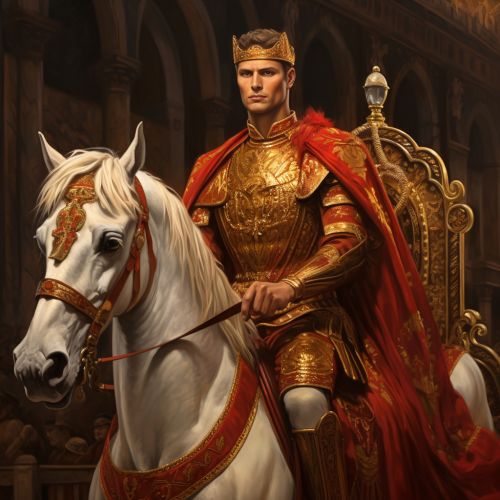Lucius Tarquinius Superbus
Early Life
Lucius Tarquinius Superbus was the legendary seventh and final King of Rome, reigning from 535 BC until the popular uprising in 509 BC that led to the establishment of the Roman Republic. He is commonly known as Tarquin the Proud, from his cognomen Superbus (Latin for "proud, arrogant, lofty").
Tarquin was the son or grandson of Lucius Tarquinius Priscus, the fifth king of Rome, and Tanaquil. Tanaquil had played a significant role in the kingship of her husband and, after his death, she ensured her son-in-law, Servius Tullius, succeeded to the throne. Tarquin was married to Tullia, the daughter of Servius Tullius.


Ascension to the Throne
Tarquin and Tullia plotted the murder of Servius Tullius and successfully carried out the plot in 535 BC. After the death of Servius Tullius, Tarquin seized control of Rome and declared himself king. He did not seek or obtain the approval of the Roman Senate, as was customary, and his ascension was marked by bloodshed and violence.
Reign
Tarquin's reign is remembered for his tyrannical rule and disregard for Roman custom and the Roman Senate. He ruled through fear and intimidation, executing senators who opposed him and filling the Senate with loyal supporters. He also engaged in a series of wars against Rome's neighbours, including the Volsci, Gabii, and the Rutuli.
Tarquin also embarked on a series of public works, including the completion of the Temple of Jupiter Optimus Maximus, one of the most important temples in Ancient Rome. He also constructed the Cloaca Maxima, Rome's great sewer system, and the Circus Maximus, a chariot racing stadium.
Overthrow and Exile
Tarquin's tyrannical rule eventually led to his downfall. The catalyst for his overthrow was the rape of Lucretia, a noblewoman, by his son Sextus Tarquinius. This act of violence, and Tarquin's refusal to punish his son, led to a popular uprising led by Lucius Junius Brutus.
The uprising resulted in the exile of Tarquin and his family, and the establishment of the Roman Republic. Despite several attempts, Tarquin was unable to regain the throne. His attempts to retake the throne led to the wars known as the Roman-Etruscan Wars.
Legacy
Despite his tyrannical rule, Tarquin's reign had a significant impact on Rome. His public works projects, particularly the Temple of Jupiter Optimus Maximus, the Cloaca Maxima, and the Circus Maximus, had a lasting impact on the city. His overthrow and the establishment of the Roman Republic marked a significant turning point in Roman history.
